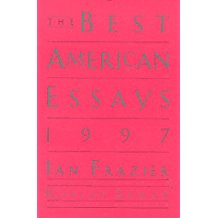The Best American Essays 1997, edited by Ian Frazier, 1997
Frazier chooses an eclectic array of essays by well known as well as totally unknown writers published in popular magazines (New Yorker, NY Times Magazine, Granta, The Atlantic) as well as little known ones. The essays: Hilton Als, Notes on my Mother; Jo Ann Beard, The Fourth State of Matter (shocking multiple murder at an astrophysics journal office); Roy Blount, Jr. First Tell Me What Kind of Reader you Are, (Northeast vs. South’s view of writers); Bernard Cooper, Labyrinthine (the newspaper maze is the metaphor for life and parents’ relationship with this writer); Louis De Bernieres, Legends of the Fall (suicides at a SE England cliff; morbid but fascinating by author of Corelli’s Mandolin); Debra Dickerson, Who Shot Johnny (a Black woman writes of her nephew’s senseless shooting and paralysis; good addition to Coates, Baldwin, and Wright, but no answers here); Richard Ford, In the Face (a well known novelist tries to understand the significance of fist fighting for boys and men); Frank Gannon, Rat Patrol: A Sage (another man trying to understand his childhood, this time through a game played on a sand pile); Dagoberto Gilb, Northeast Direct (an author sits behind a man reading his novel on a train and considers their anonymity in this very big world); Verlyn Klinkenborg, We are Still Only Human (contrasting geologic time and evolution with the brief span allowed to each of us–“an opening, a life, allowed to each one of us, an interval of consciousness an action. What is possible is possible only within that clearing, not in some distant future. That clearing is the present which rolls forward through the calendar, year by year, century by century.”; Natalie Kusz, Ring Leader (an overweight, insecure teacher in Alaska gets a nose ring and finds her true self); Naton Leslie, Don’t Get Too Comfortable (a railroad detective, Charley Best, provides the stories a father and then his son tell); Thomas McGuane, Twenty-Fish Days (a 55 year old McGuane revisits his childhood while fishing in RI); Cullen Murphy, Backlogs of History (information overload in the modern age is triggered by a bill from the author’s delivery); Cynthia Ozick, A Drugstore Eden (a distinguished woman of American letters recalls her childhood in NYC and Pelham Bay: the pharmacy, her Uncle Ruby, the garden, the War); Lukie Chapman Reilly, My Father (a woman struggles with her father’s memory and his lack of love and affection towards her); Luc Sante, Living in Tongues (a literary critic muses about growing up with French and writing in English); Paul Sheehan, My Habit (a writer collects cocaine vials in NYC as a way of exploring aesthetic moral statements); Charles Simic, Dinner at Uncle Boris’s (a Czech poet transplanted to Oak Park reminisces about his uncle’s dinners, drinking, and singing); Lauren Slater, Black Swans (the future editor of Best American Essays 2006 writes about her OCD and Prozac); Susan Sontag, A Century of Cinema (the famous writer muses about the death of cinema in the late 20th C. Oh for Goddard again!); Gay Talese, Ali in Havana (the story of Ali’s visit to Castro on a humanitarian mission. Ali, Teofilo. Ed Bradley are dead but Talese and Castro continued into their 80’s); Le Thi Diem Thuy, The Gangster We Are All Looking For (a Vietnamese refugee writes about her family’s history and difficult time in the US); Joy Williams, The Case Against Babies (a rant against the American need to have babies whatever it takes while more humans means more extinctions for other species). Great collection, long on family and the dysfunctions they cause.



